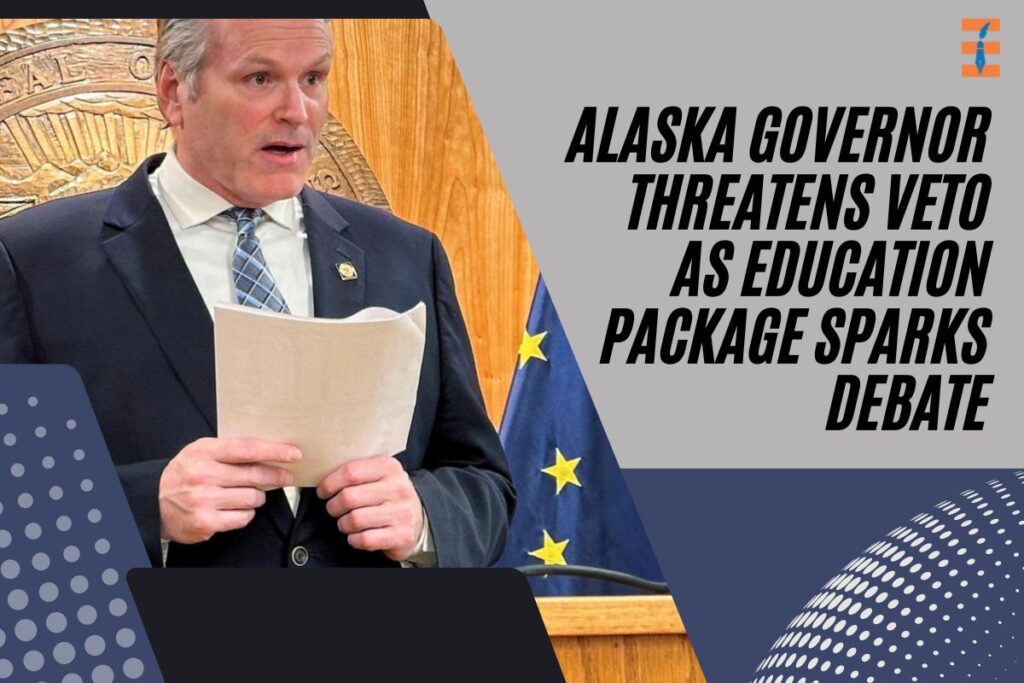JUNEAU, Alaska — Alaska Governor Mike Dunleavy, a former educator, has issued a stern warning of a potential veto for an education package recently passed by lawmakers, citing its perceived shortcomings. The contentious debate centers around a lack of provisions favored by the governor, particularly the absence of a pilot program that would offer annual bonuses of up to $15,000 to attract and retain teachers.
With a background in education, Governor Mike Dunleavy contends that there is still an opportunity for lawmakers to address crucial issues within the package, such as the proposed teacher bonuses and changes to the charter school application process. The governor holds a 15-day window, excluding Sundays, to decide on the bill sent by the Legislature, and a resolution is expected by March 14.
While the package secured overwhelming support from lawmakers, some key figures question its viability and whether the state can afford the proposed bonuses.
The education funding debate has taken center stage in this legislative session. The House, in a 38-2 vote last week, approved a compromise package featuring a $ 175 million increase in aid to districts through a school funding formula. The package also included language encouraging districts to allocate additional funding for teacher salary and retention bonuses, a dedicated state education department position supporting charter schools, and extra funding for K-3 students requiring reading assistance.
Alaska Senate Approves Education Funding Package
The Senate, led by a bipartisan coalition, voted 18-1 on Monday to support the package, forwarding it to Governor Mike Dunleavy for consideration.
This compromise emerged from negotiations after the House failed to bring a version of the bill up for debate. The initial version, which advanced from the House Rules Committee, included Governor Mike Dunleavy’s bonus plan, charter school provisions, and an approximately $80 million increase in state aid through the formula.
Following the House’s approval, Speaker Cathy Tilton acknowledged that the compromise fell short of the earlier proposal but deemed it a ‘qualified’ success.
Despite school officials advocating for a more substantial funding increase of around $360 million, citing the impact of inflation and rising energy and insurance costs, the state’s financial challenges have raised doubts about the feasibility of such an amount. Alaska, heavily reliant on oil revenue and earnings from its oil-wealth fund, has grappled with deficits over the past decade.
Governor Mike Dunleavy has championed the bonuses and support for charter schools as innovative approaches to education. He questions whether a simple increase in district funding would lead to improved student performance. His proposed bonus plan suggests payments ranging from $5,000 to $15,000 annually over three years, with higher amounts for teachers in remote areas. The estimated cost of the program is around $55 million per year.
Despite language in the education package encouraging districts to allocate funds for bonuses, Dunleavy’s spokesperson, Grant Robinson, emphasized that it does not guarantee the desired outcomes.
Alaska’s Dividend Debate: Awaiting Start Amid Fiscal Concerns
Senate President Gary Stevens, a Republican, expressed concerns about the state’s financial limits, with a revised revenue forecast expected in mid-March. Meanwhile, the contentious debate over this year’s dividend payout to residents from oil-wealth fund earnings has yet to commence.
While the compromise bill received significant support, Senator Bill Wielechowski, an Anchorage Democrat, raised doubts about the effectiveness of bonuses, suggesting that foreign or Lower 48 teachers might leave after the three-year incentive period. He acknowledged the unprecedented support for the controversial measure but questioned the practicality of its outcomes.
Tom Klaameyer, president of NEA-Alaska, a teachers’ union, emphasized the urgency of passing the education package, characterizing it as a life preserver for schools facing a crisis. The potential veto, he argues, would leave schools in dire straits, urging decision-makers to act swiftly to avert the impending challenges.
Also Read: Alaska Education Commissioner Alters Course on School Funding Formula Increase










